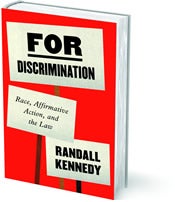Randall Kennedy has tackled plenty of controversial issues in his five previous books, ranging from interracial marriage to the intersection of race, crime and the law. The Harvard Law professor comes to the defense of affirmative action in his latest book, “For Discrimination,” published by Pantheon in September. Kennedy argues there’s still a need for racial preferences, which benefit racial minorities and also help America as a whole to “redress long-standing injustices and to knit together a deeply divided society.”
In an interview with the Bulletin, Kennedy described his own evolution on the issue and the impact of the Supreme Court’s ruling in Fisher v. University of Texas at Austin, which was announced after his book went to print.
You start your book by recalling watching a movie at age 8 in a blacks-only balcony of a movie theater in Jim Crow-era South Carolina. How have your own experiences shaped your view of affirmative action?
Mere experience can lead you to lots of different positions. What matters is what you do with experience. There are plenty of people with experience like mine who are against affirmative action. See, for example, Clarence Thomas. I’ve had varying thoughts over time about affirmative action. I’ve always been on balance for it but in an earlier period of time much less a defender, much less a champion than I am now. That was one of the surprises that arose in writing the book. Why did I see it differently this time? Maybe, it’s because I thought about the subject more systematically and more clearly.
You compare affirmative action to “an injured bear: too strong to succumb to its wounds but too hurt to attain full vitality.” After the Court’s Fisher decision, which directed the lower courts to review the University of Texas’ race-conscious admissions policy, is that still your assessment?

Post-Fisher, affirmative action is slightly more injured. The Court vacated the Court of Appeals’ opinion, but it did not reverse the judgment, at least not yet. It just said, “You all didn’t apply the law the way we want and so we’re sending the case back to you.”
Although the Court left open the possibility of the affirmative action plan being upheld, it shifted things a step or two in an anti-affirmative action direction.
Is there a future for Top 10 Percent Plans, in which public schools automatically admit top-ranked students, such as the one at issue in Fisher? If not, what’s likely to replace that model?
A number of anti-affirmative action justices have spoken favorably of 10 percent plans as race neutral, but in my view they’re not. That’s one of the reasons I say that no matter how Fisher is read, the affirmative action controversy will continue. The next fight will be over 10 percent plans.
You describe several arguments in favor of affirmative action. Has too much emphasis been put on creating diversity, particularly by Supreme Court justices since Bakke, the 1978 decision which held that institutions of higher education could use race as an admissions criterion?
Yes, I think so. In many discussions about affirmative action, the diversity rationale is all anybody talks about. It’s an appropriate justification but there are other strong justifications as well. In my book, I emphasize in particular that the Supreme Court has pushed off the radar screen the idea of rectifying the ongoing consequences of past discrimination. I think that’s an important [idea that] packs a lot of moral punch. As far as I’m concerned, it should also be part of the discussion and should be a prime justification for affirmative action.
You argue that aspiring to create a colorblind society is “misconceived” and that the concept has been co-opted.
A problem for people like me who don’t like the colorblindness trope is we’re going to have to figure out a trope that is as succinct and vivid, and I don’t have one. Mosaic, orchestra, salad—these are all figures of speech people have come up with as counterpoints, as alternatives, but I don’t think any of them have the metaphorical vibrancy or resonance of colorblindness. So I need to think of something.
